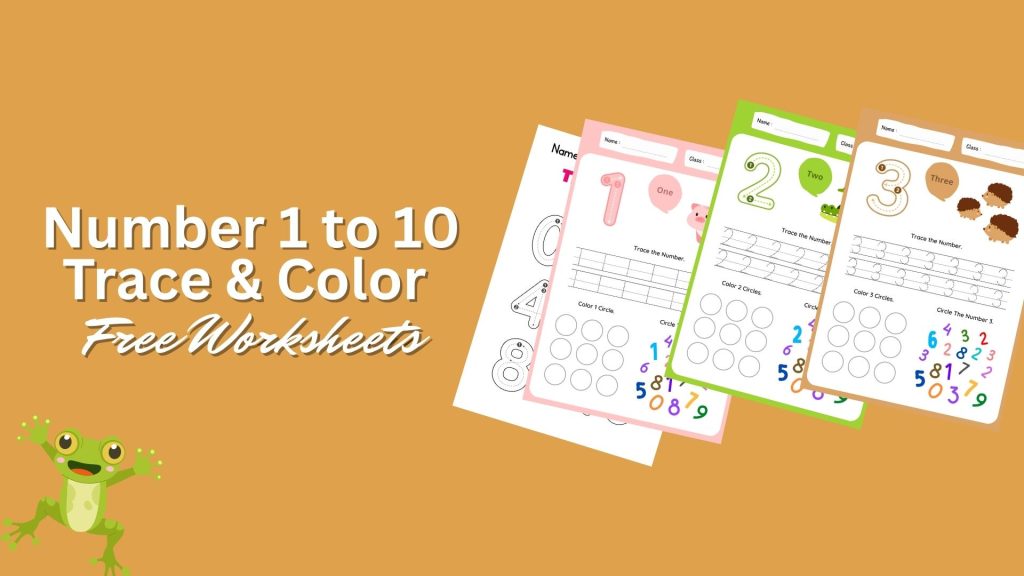
Number tracing Worksheets helps children learn to write numbers the right way. These worksheets build early maths skills that children need for school. They let kids move step by step from tracing to writing on their own. Our free sheets work well for nursery, reception, and Year 1 pupils. They also help home learners and children who need extra practice with numbers.
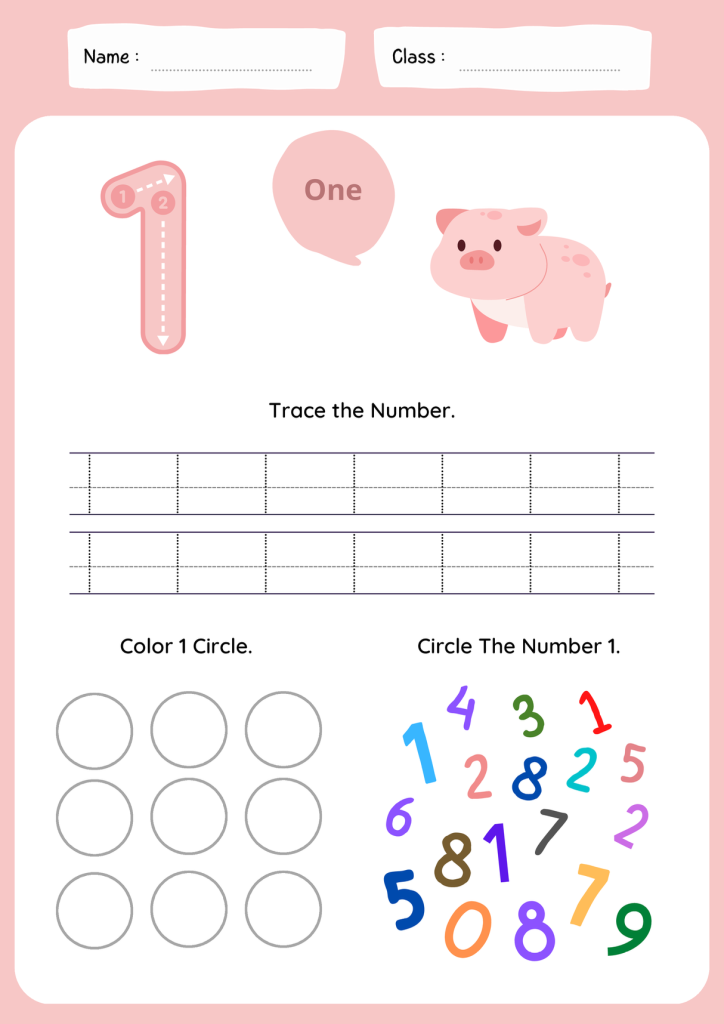
Number 1 Worksheet: Featuring a cute pink pig, helps children trace the number 1, color one circle, and find all the number 1s among mixed numbers. Perfect for introducing the concept of ‘one’ & number recognition skills.
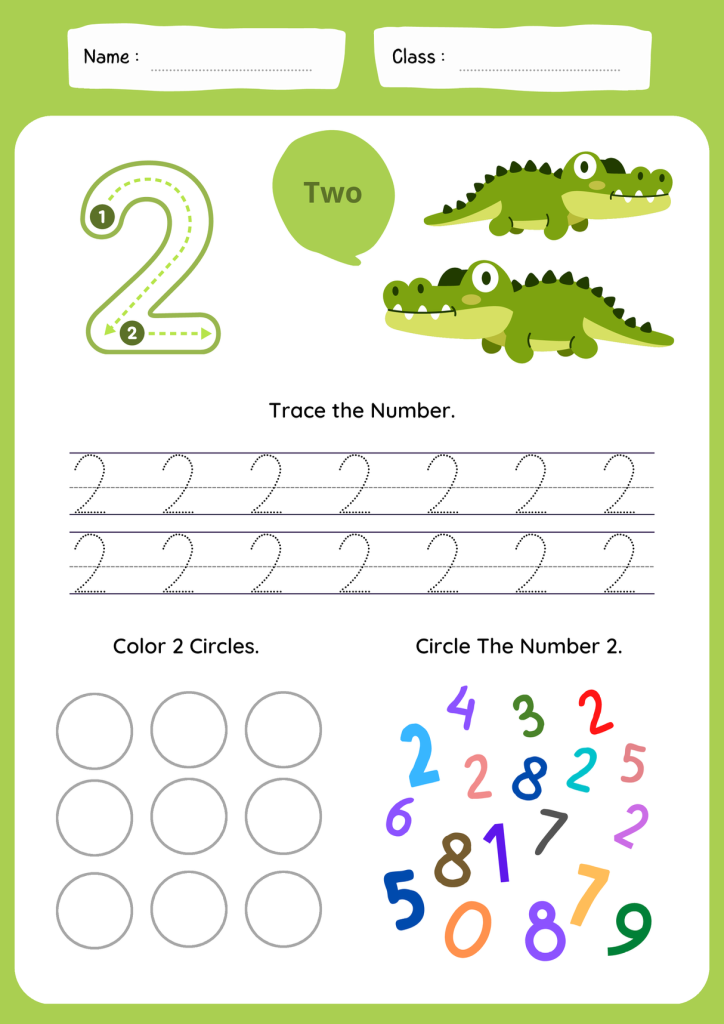
Number 2 Worksheet: Featuring two playful crocodiles, helps children trace the number 2, color two circles, and find all the number 2s among mixed numbers. Perfect for introducing the concept of ‘two’ and number recognition skills.
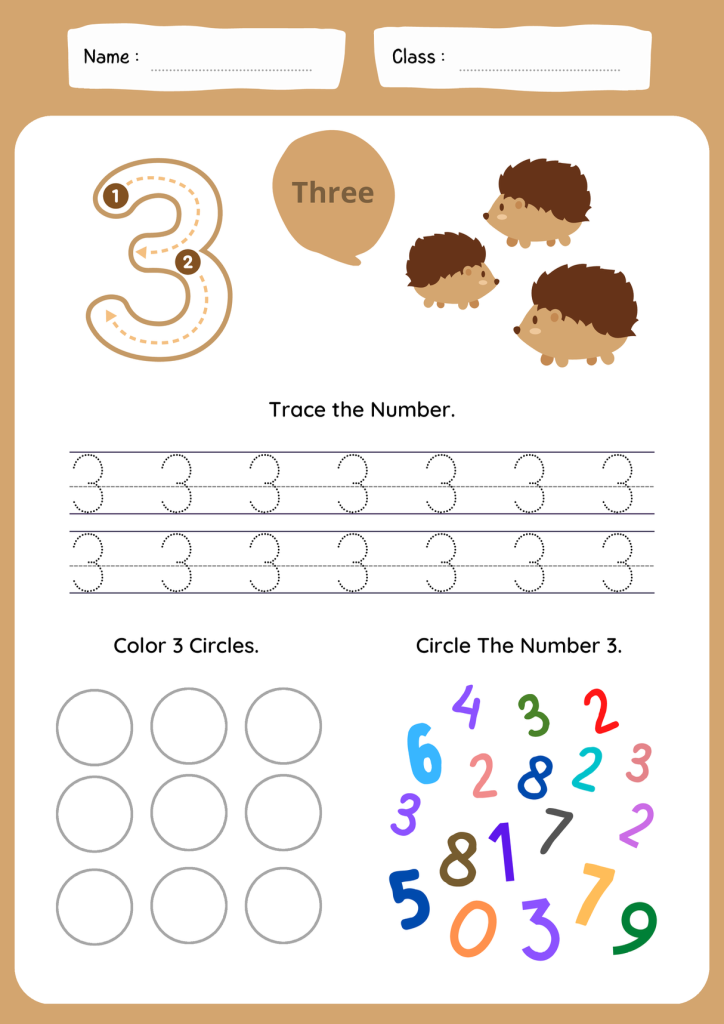
Number 3 Worksheet: Featuring three hedgehogs, helps children trace the number 3, color three circles, and find all the number 3s among mixed numbers. Perfect for introducing the concept of ‘three’ and number recognition skills.
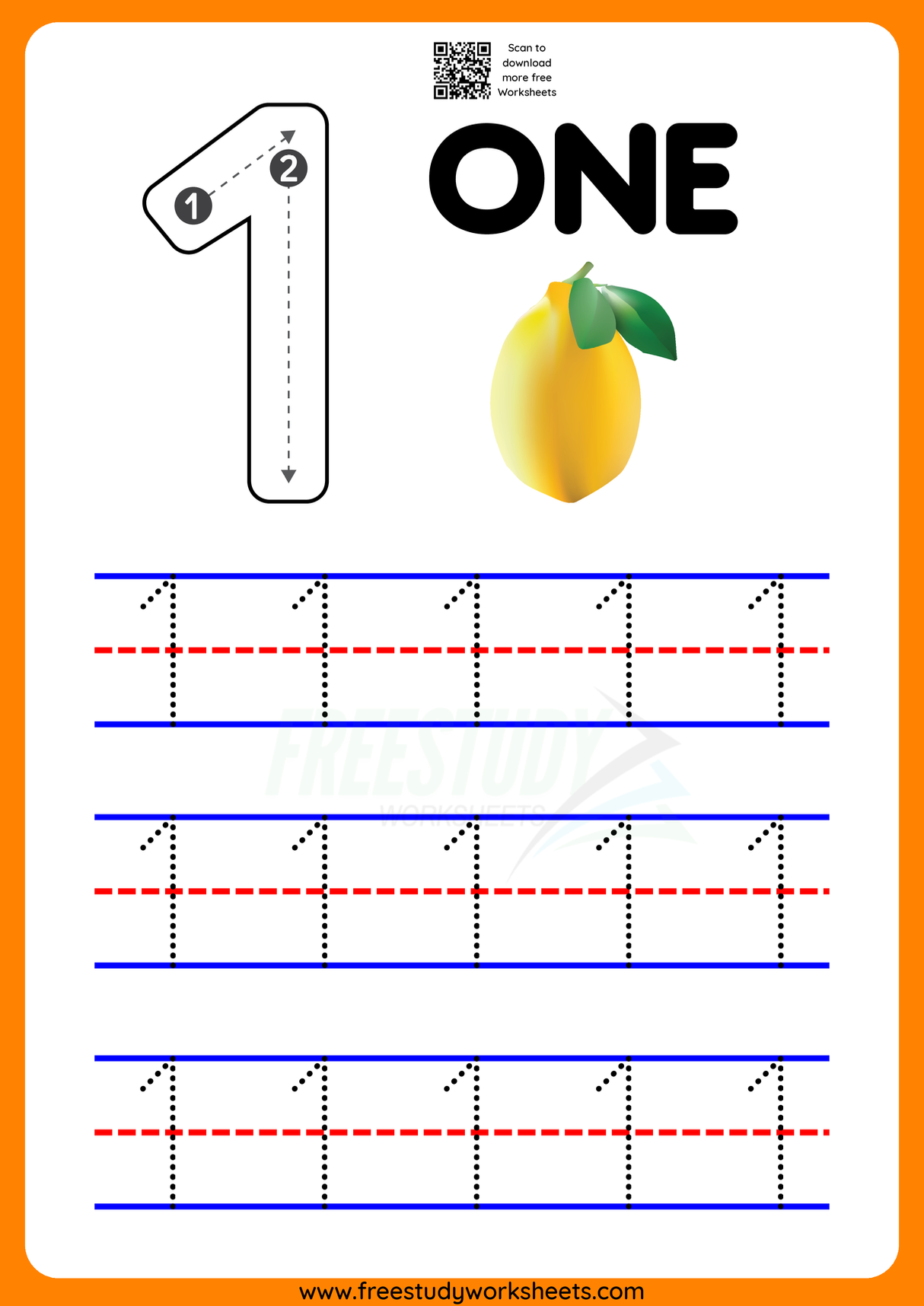
Number 1 Tracing Worksheet: Featuring one lemon, this practice sheet teaches proper number 1 formation with guided tracing and color-coded lines.
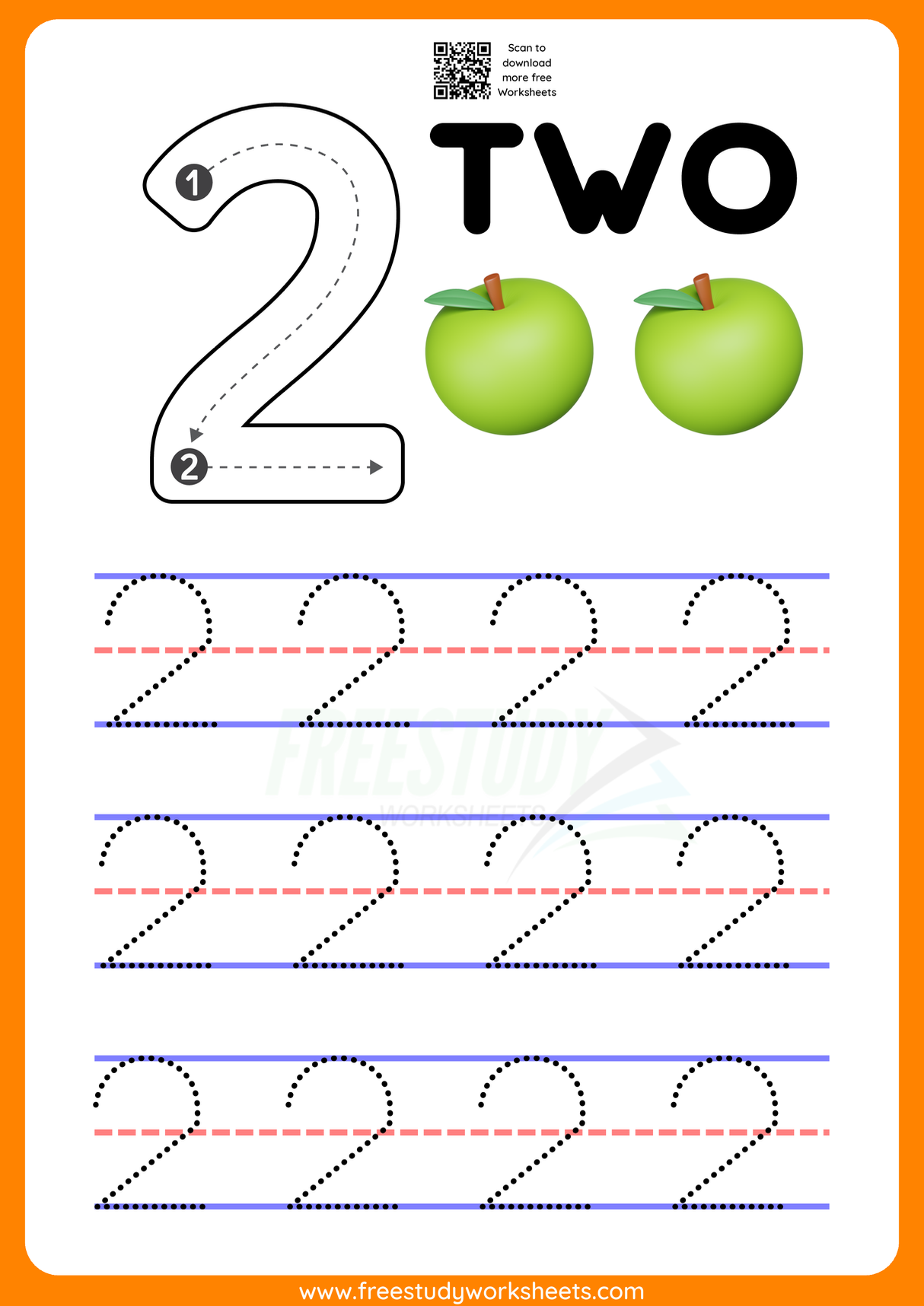
Number 2 Tracing Worksheet: Featuring two green apples, this practice sheet teaches proper number 2 formation with guided tracing and color-coded lines.
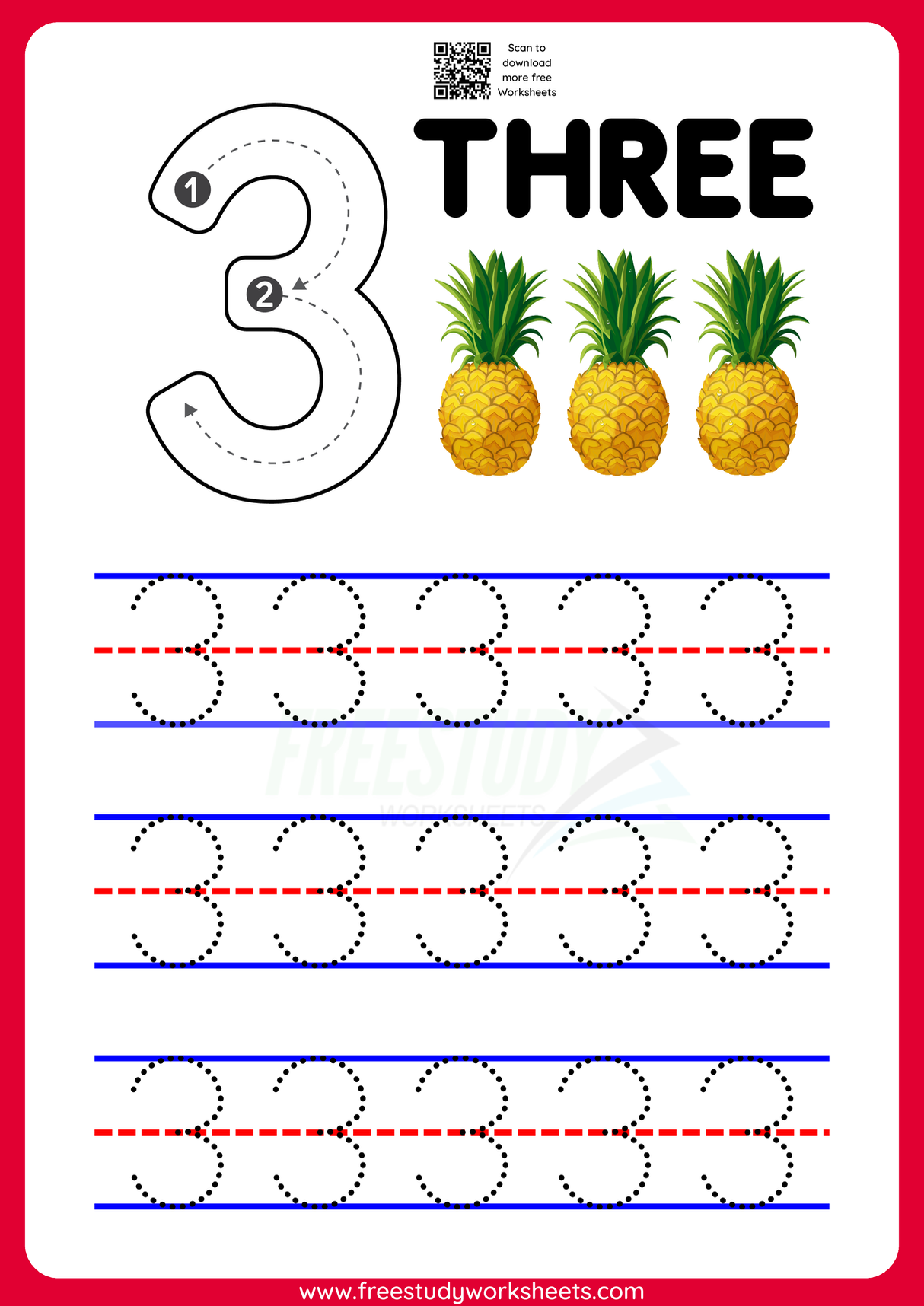
Number 3 Tracing Worksheet: Featuring three pineapples, this practice sheet teaches proper number 3 formation with guided tracing and color-coded lines.
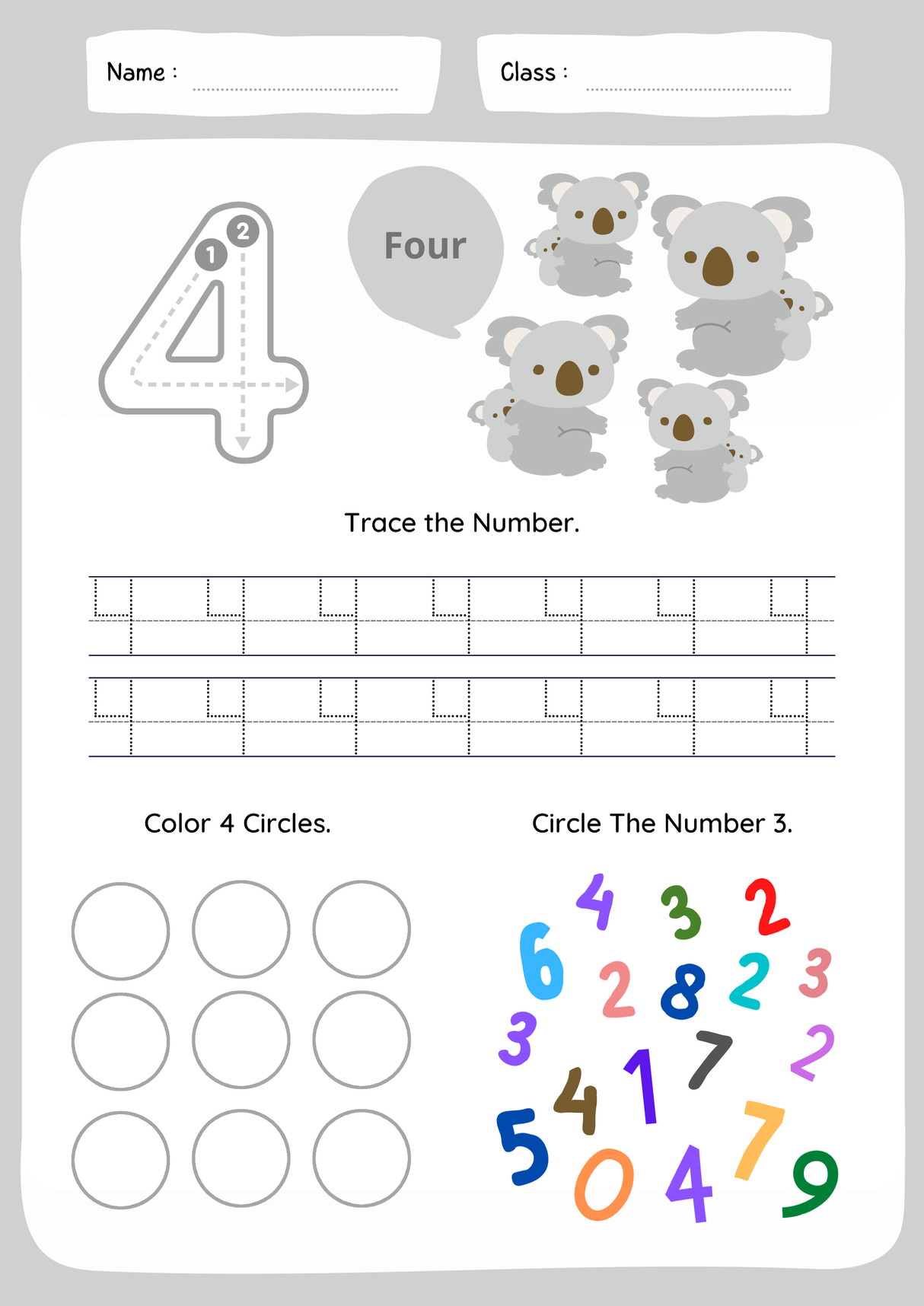
Number 4 Worksheet: Featuring four cuddly koalas, this worksheet helps children trace the number 4, color four circles, and find all the number 4s among mixed numbers. Perfect for introducing the concept of ‘four’ and number recognition skills.
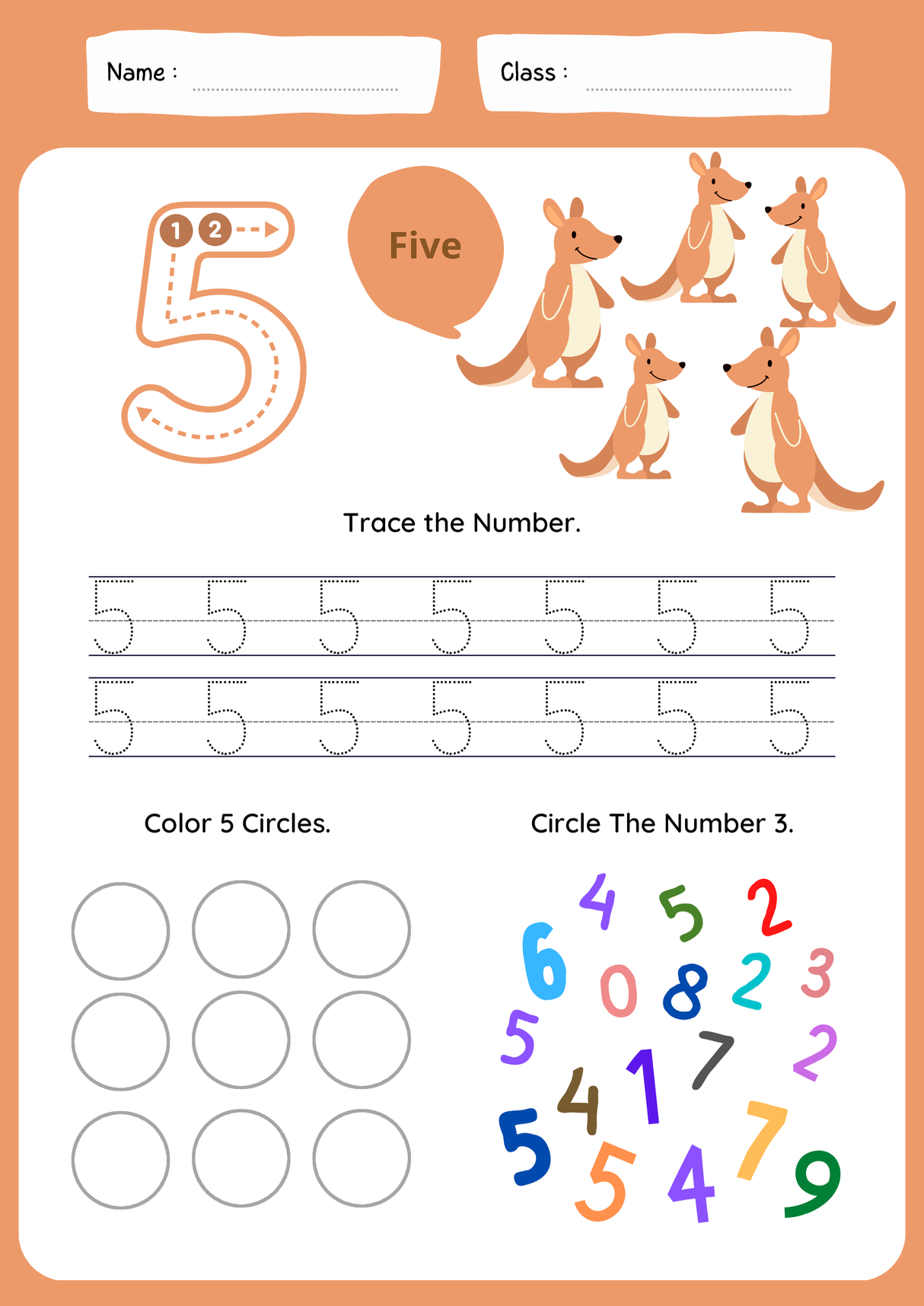
Number 5 Worksheet: Featuring five hopping kangaroos, this worksheet helps children trace the number 5, color five circles, and find all the number 5s among mixed numbers. Perfect for introducing the concept of ‘five’ and number recognition skills.
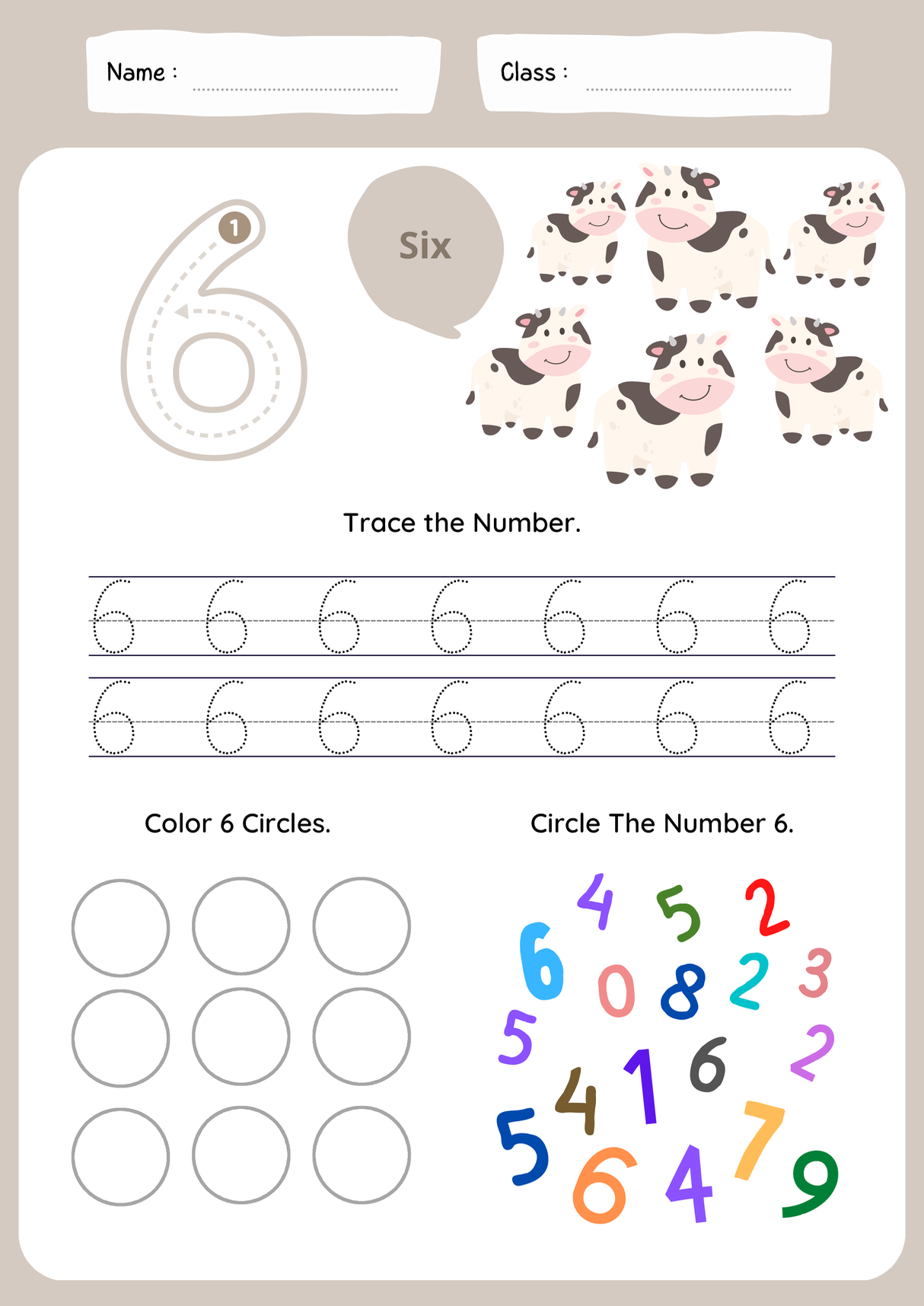
Number 6 Worksheet: Featuring six adorable cows, this worksheet helps children trace the number 6, color six circles, and find all the number 6s among mixed numbers. Perfect for introducing the concept of ‘six’ and number recognition skills.
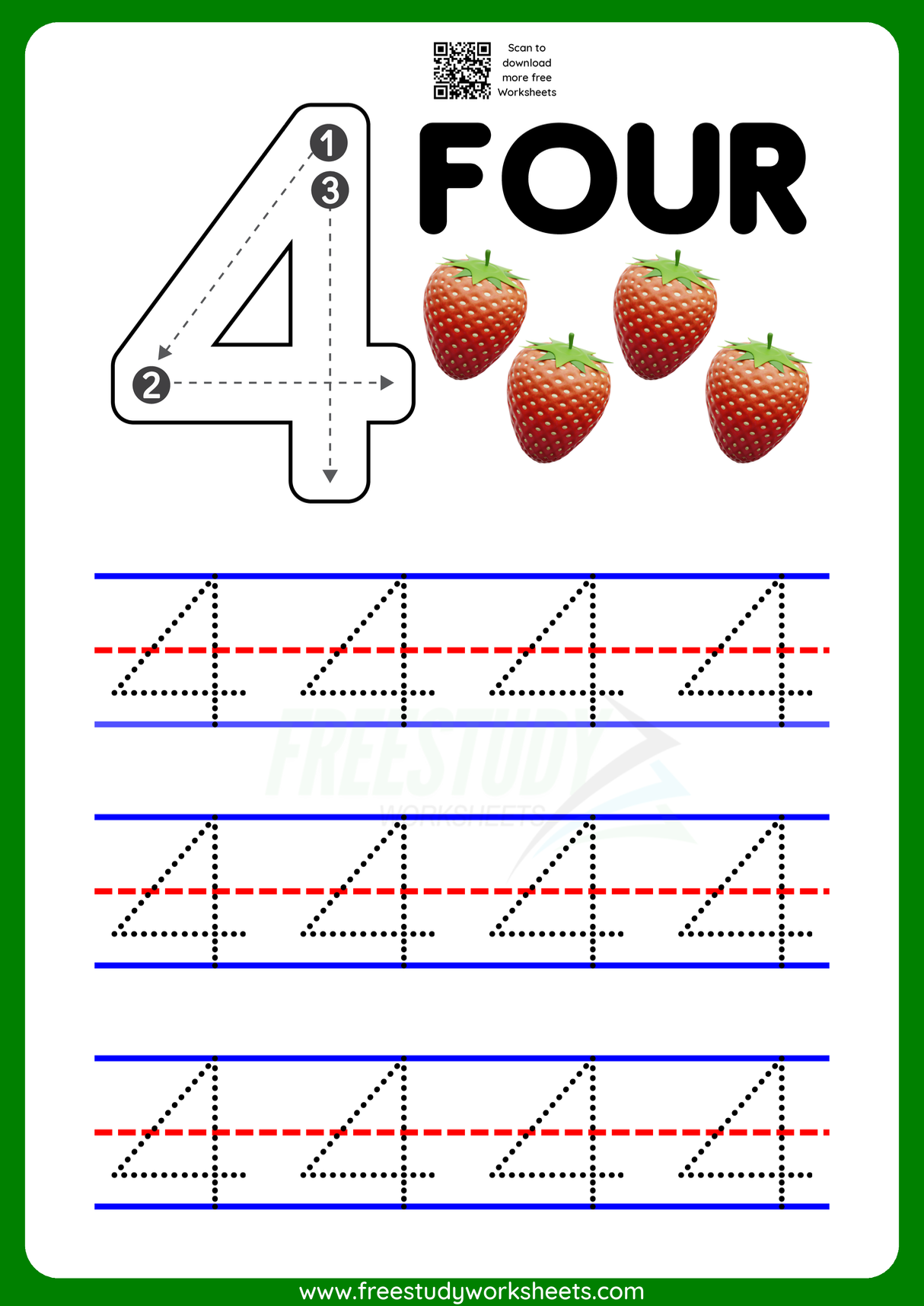
Number 4 Tracing Worksheet: Featuring four strawberries, this practice sheet teaches proper number 4 formation with guided tracing and color-coded lines.
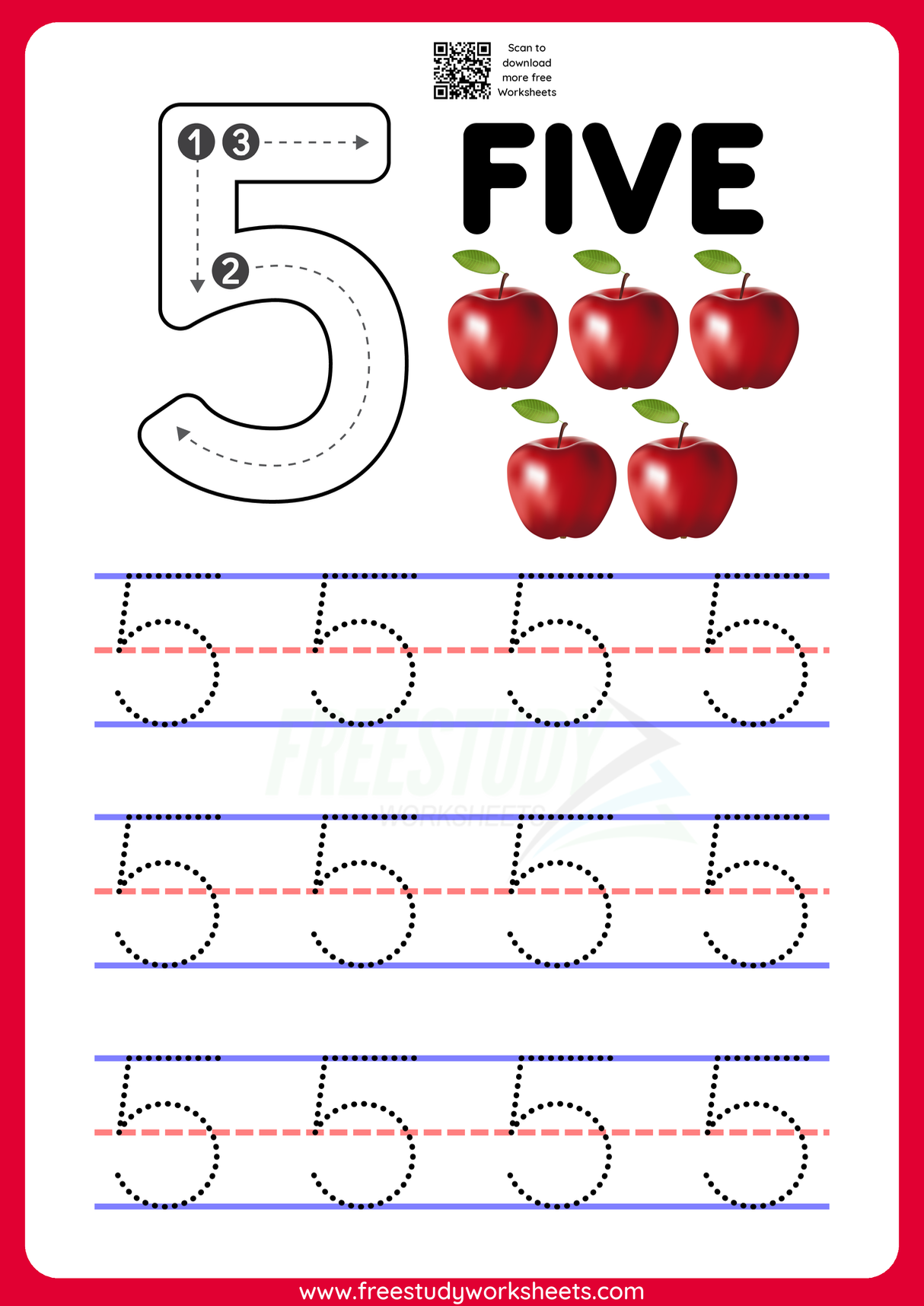
Number 5 Tracing Worksheet: Featuring five red apples, this practice sheet teaches proper number 5 formation with guided tracing and color-coded lines.
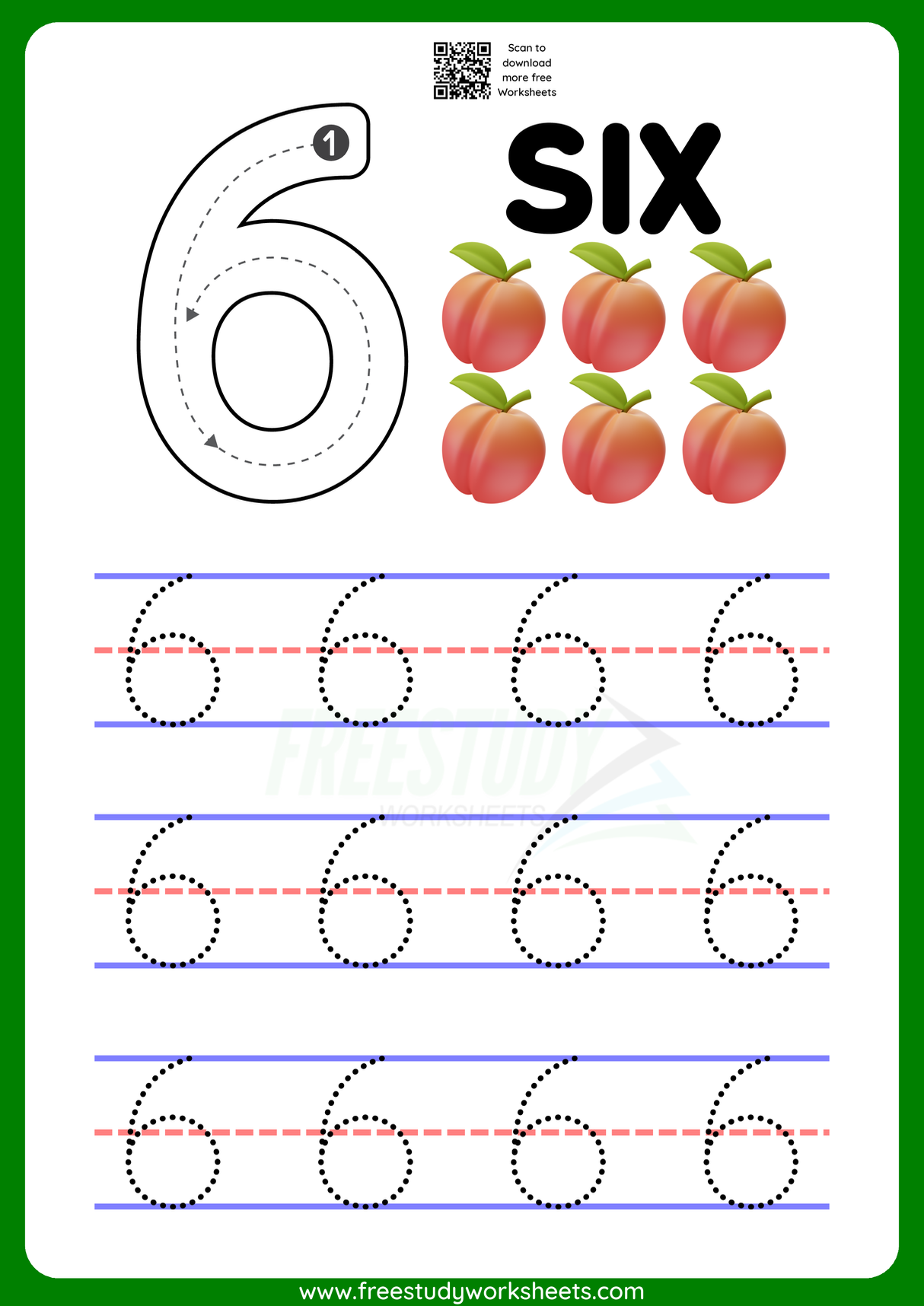
Number 6 Tracing Worksheet: Featuring six peaches, this practice sheet teaches proper number 6 formation with guided tracing and color-coded lines.
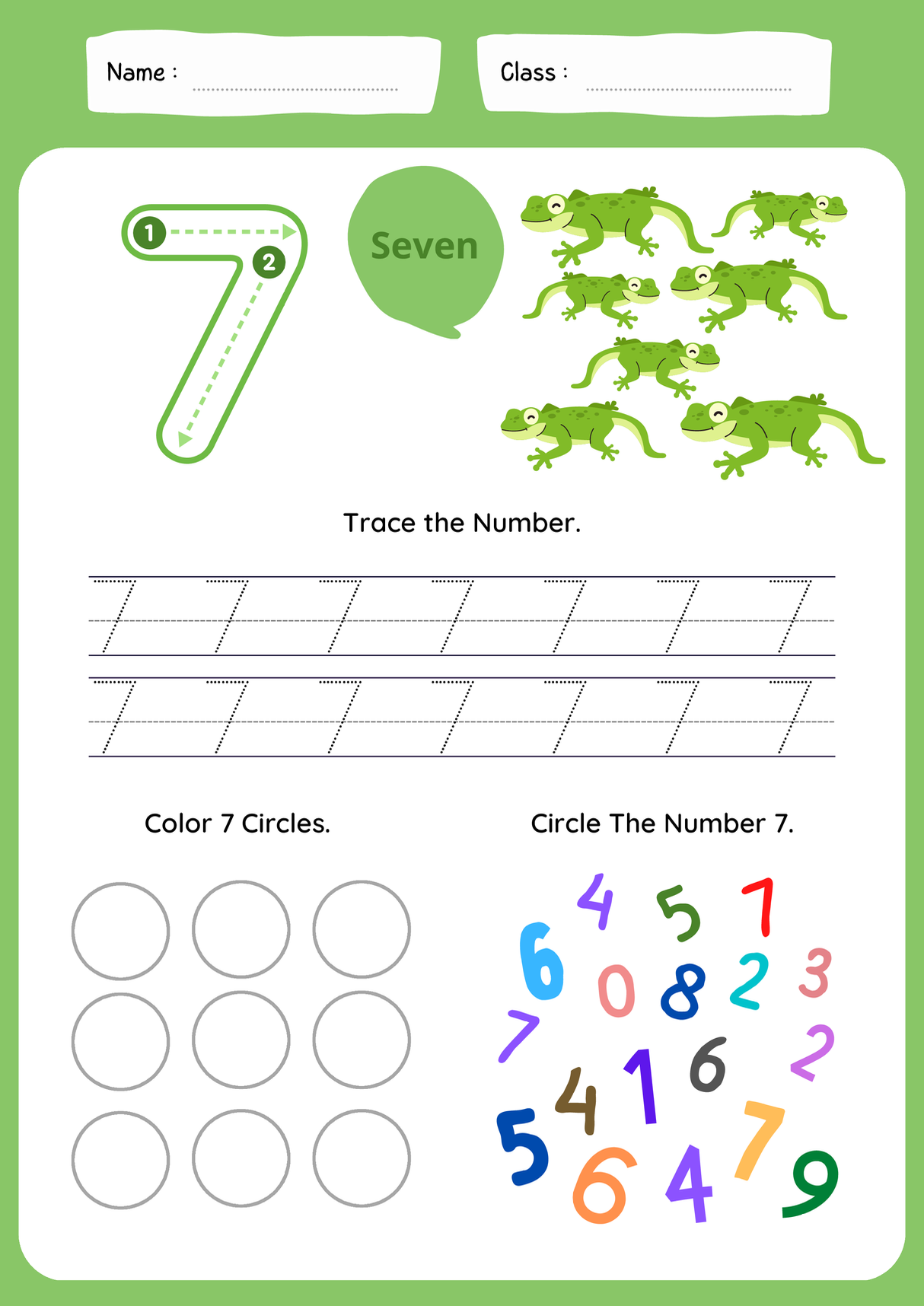
Number 7 Worksheet: Featuring seven green lizards, this worksheet helps children trace the number 7, color seven circles, and find all the number 7s among mixed numbers. Perfect for introducing the concept of ‘seven’ and number recognition skills.
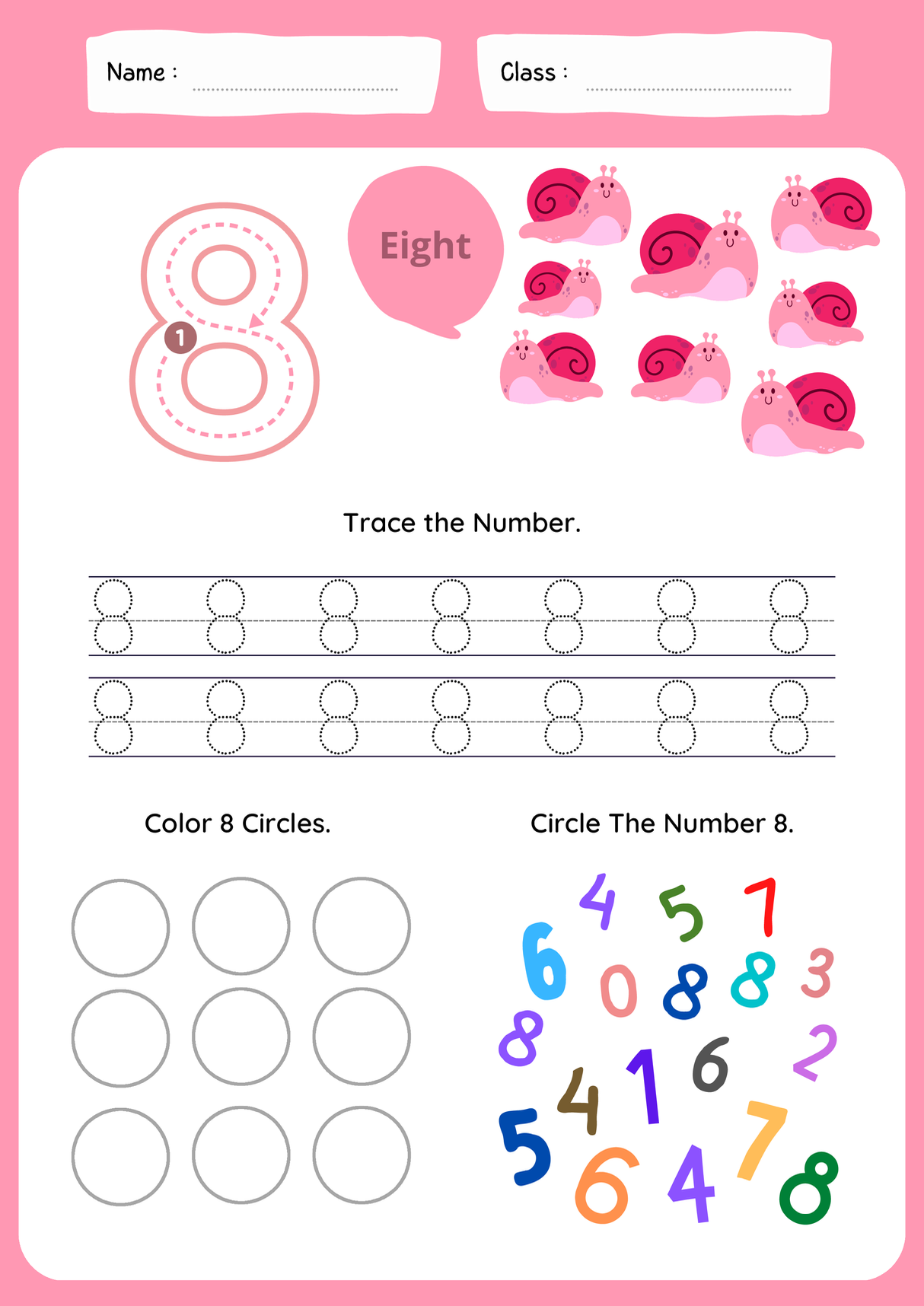
Number 8 Worksheet: Featuring eight cute pink snails, this worksheet helps children trace the number 8, color eight circles, and find all the number 8s among mixed numbers. Perfect for introducing the concept of ‘eight’ and number recognition skills.
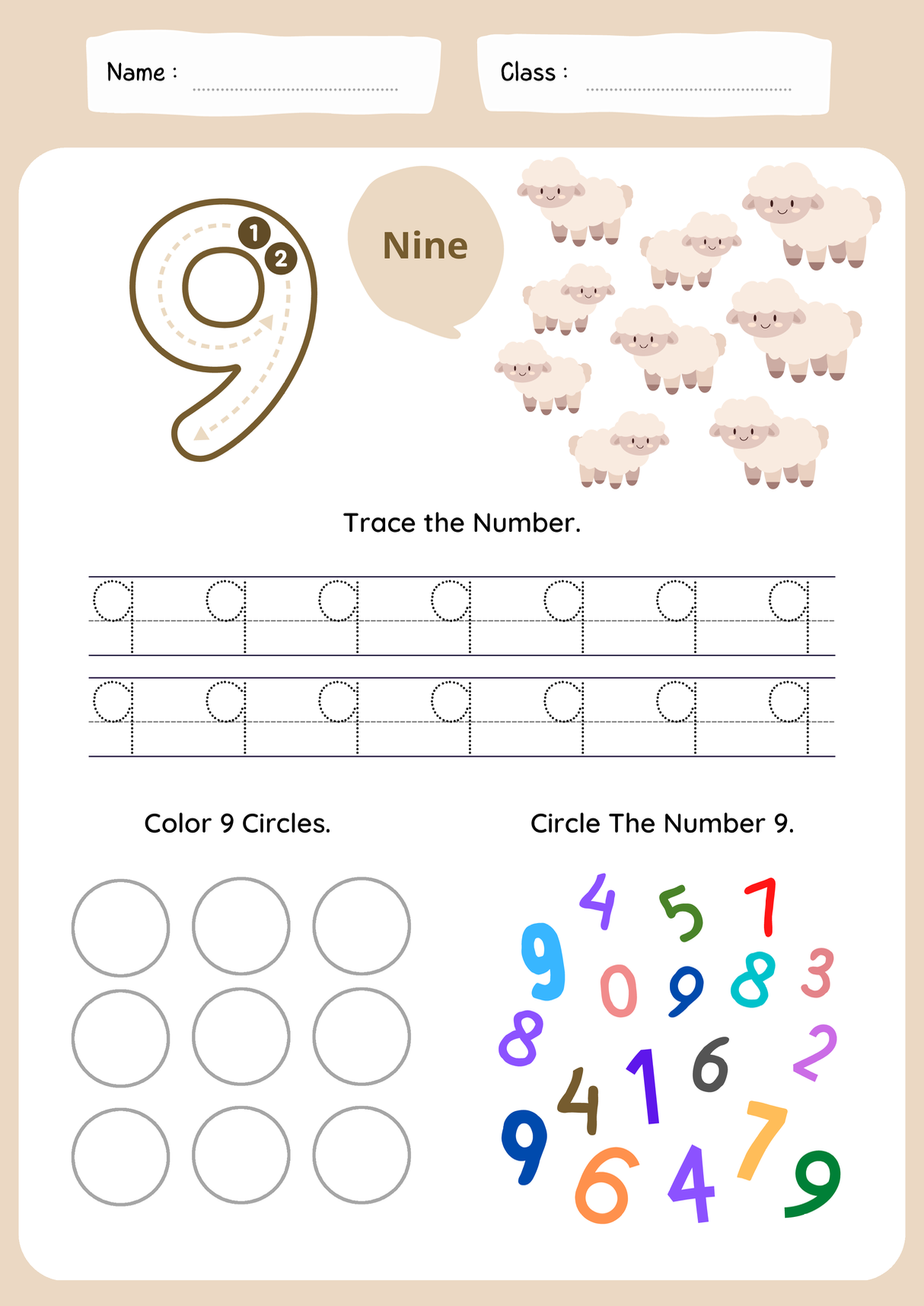
Number 9 Worksheet: Featuring nine fluffy white sheep, this worksheet helps children trace the number 9, color nine circles, and find all the number 9s among mixed numbers. Perfect for introducing the concept of ‘nine’ and number recognition skills.
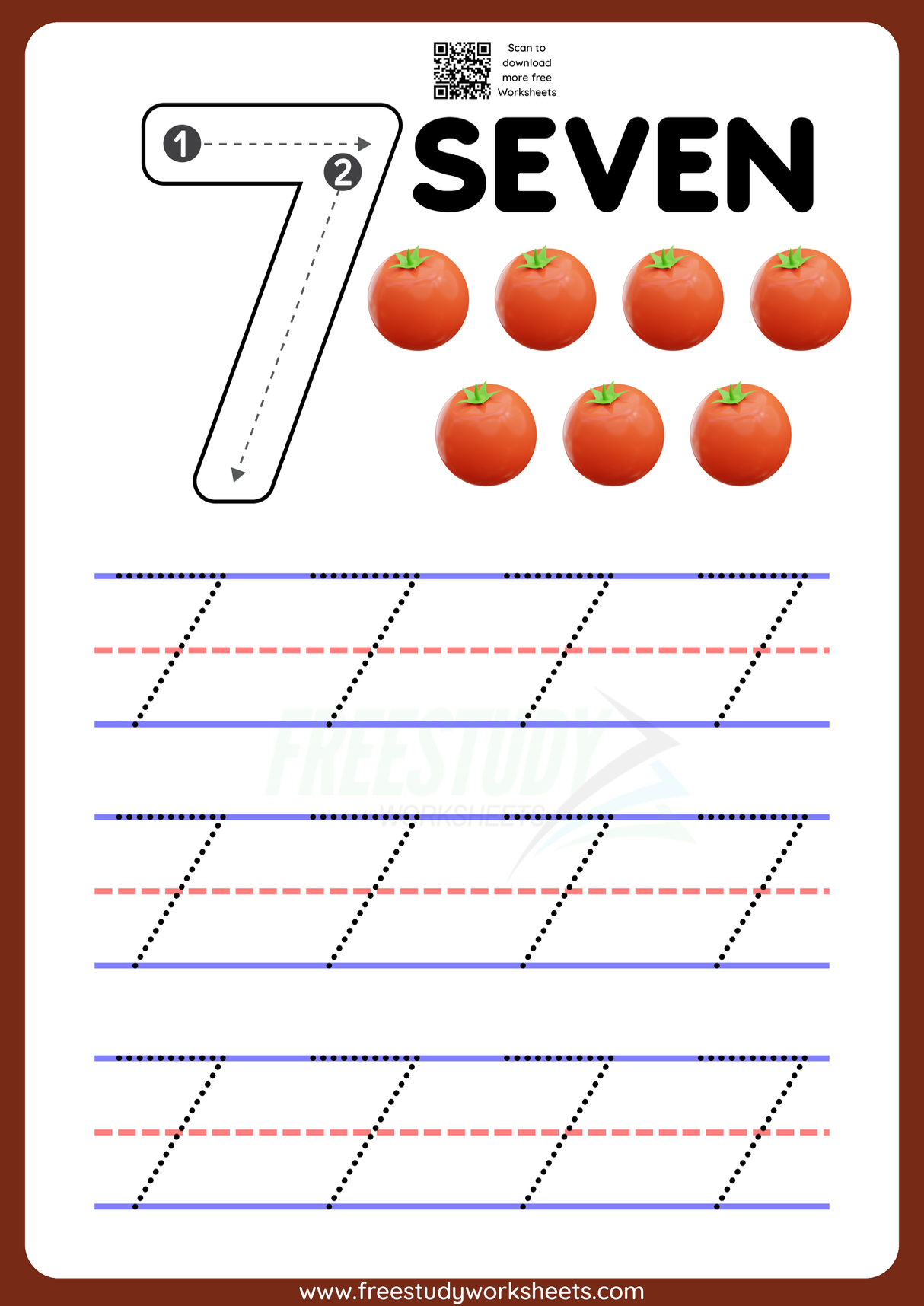
Number 7 Tracing Worksheet: Featuring seven tomatoes, this practice sheet teaches proper number 7 formation with guided tracing and color-coded lines.
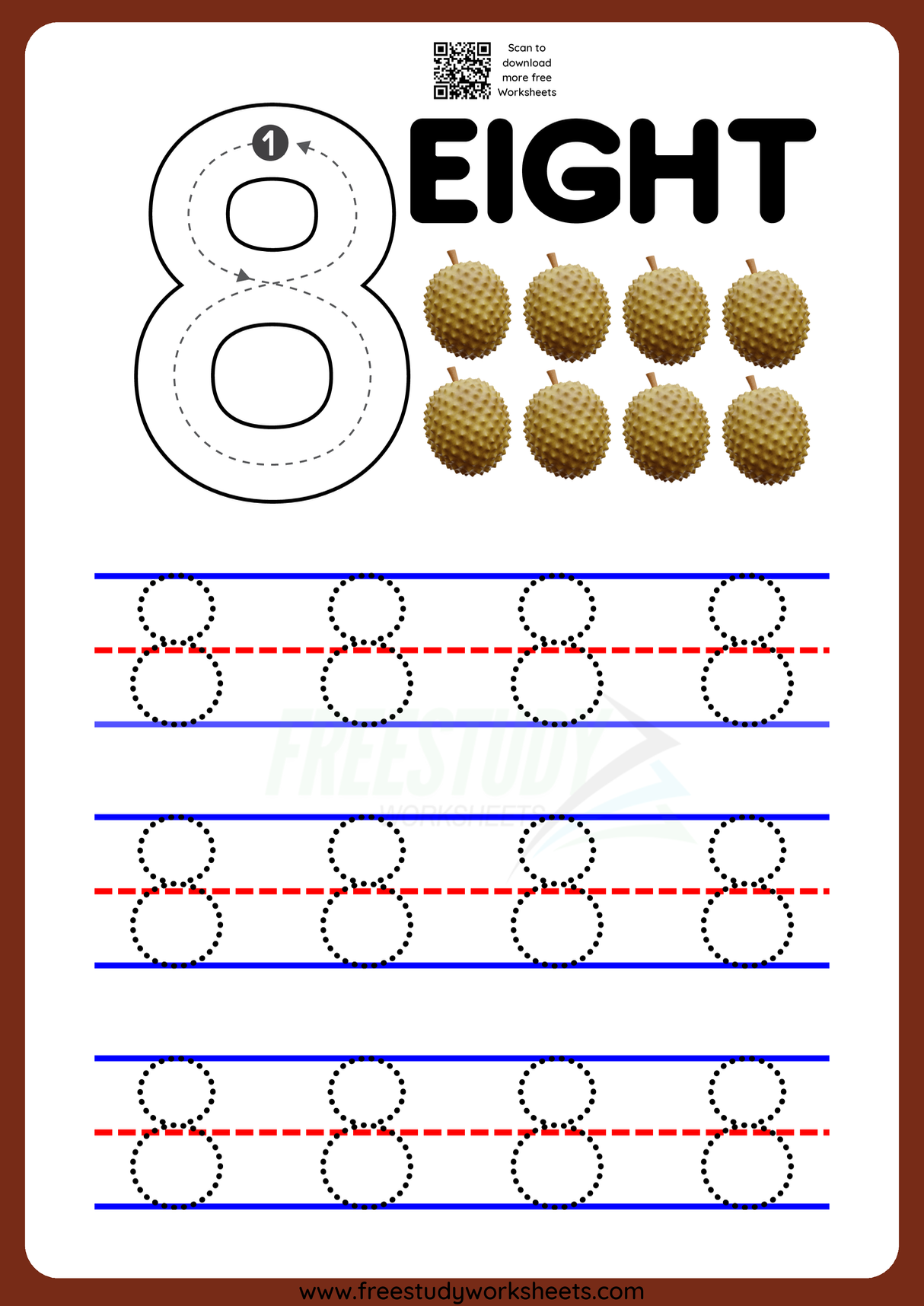
Number 8 Tracing Worksheet: Featuring eight durians, this practice sheet teaches proper number 8 formation with guided tracing and color-coded lines.
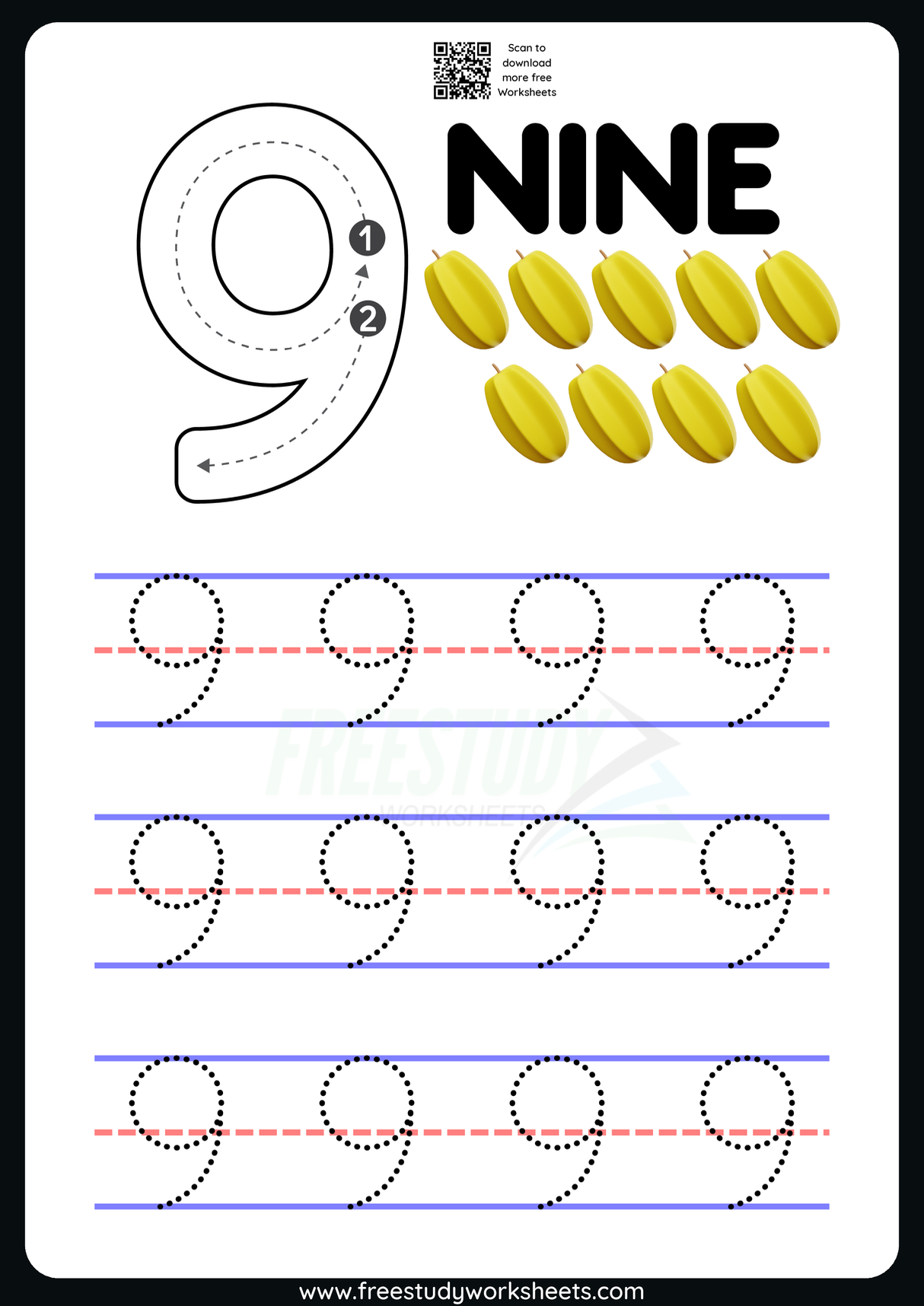
Number 9 Tracing Worksheet: Featuring nine bananas, this practice sheet teaches proper number 9 formation with guided tracing and color-coded lines.
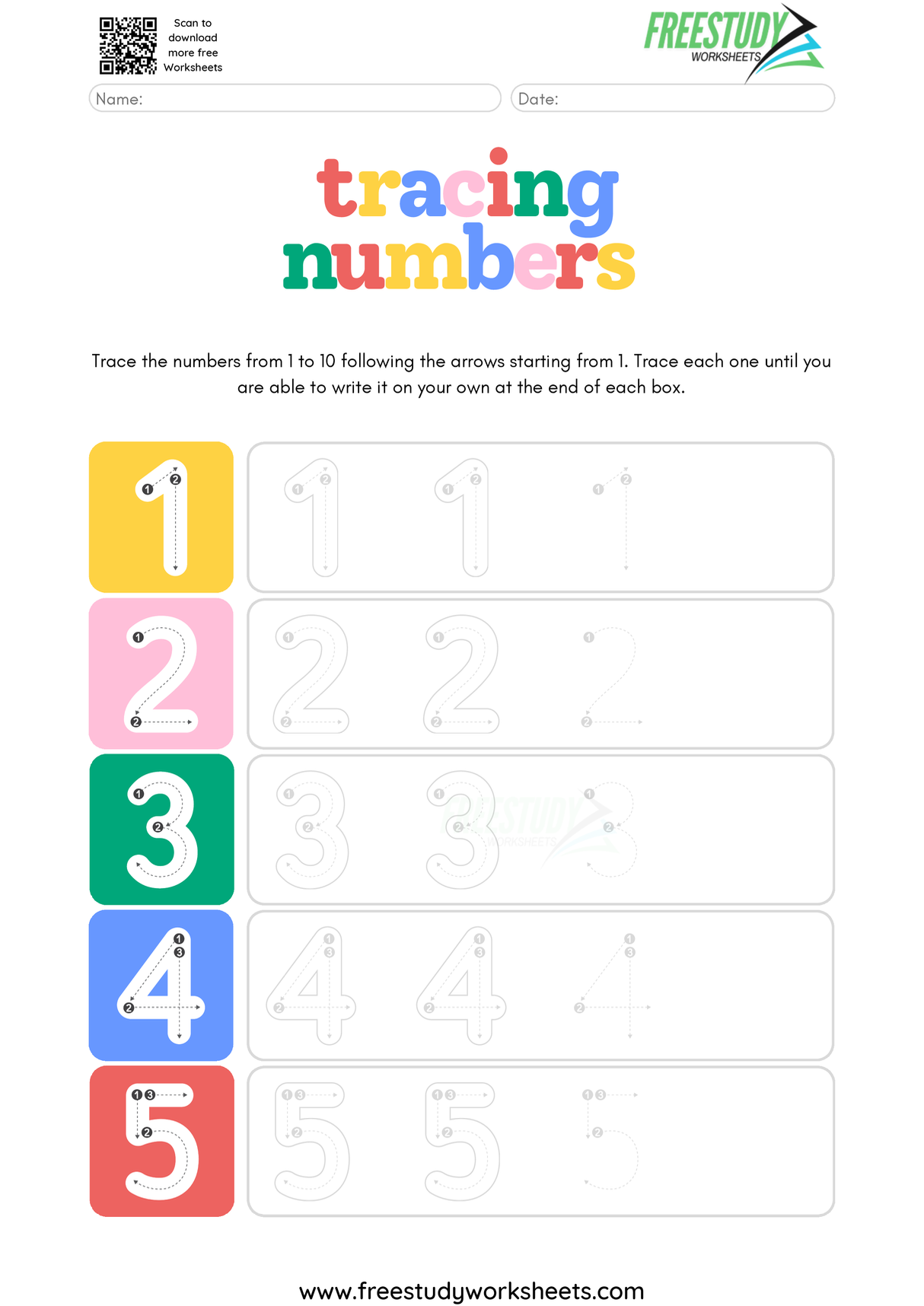
Tracing Numbers Worksheet (1-10): This progressive practice sheet features numbers 1-5 with color-coded guides, directional arrows, and multiple practice spaces that transition from guided tracing to independent writing practice.
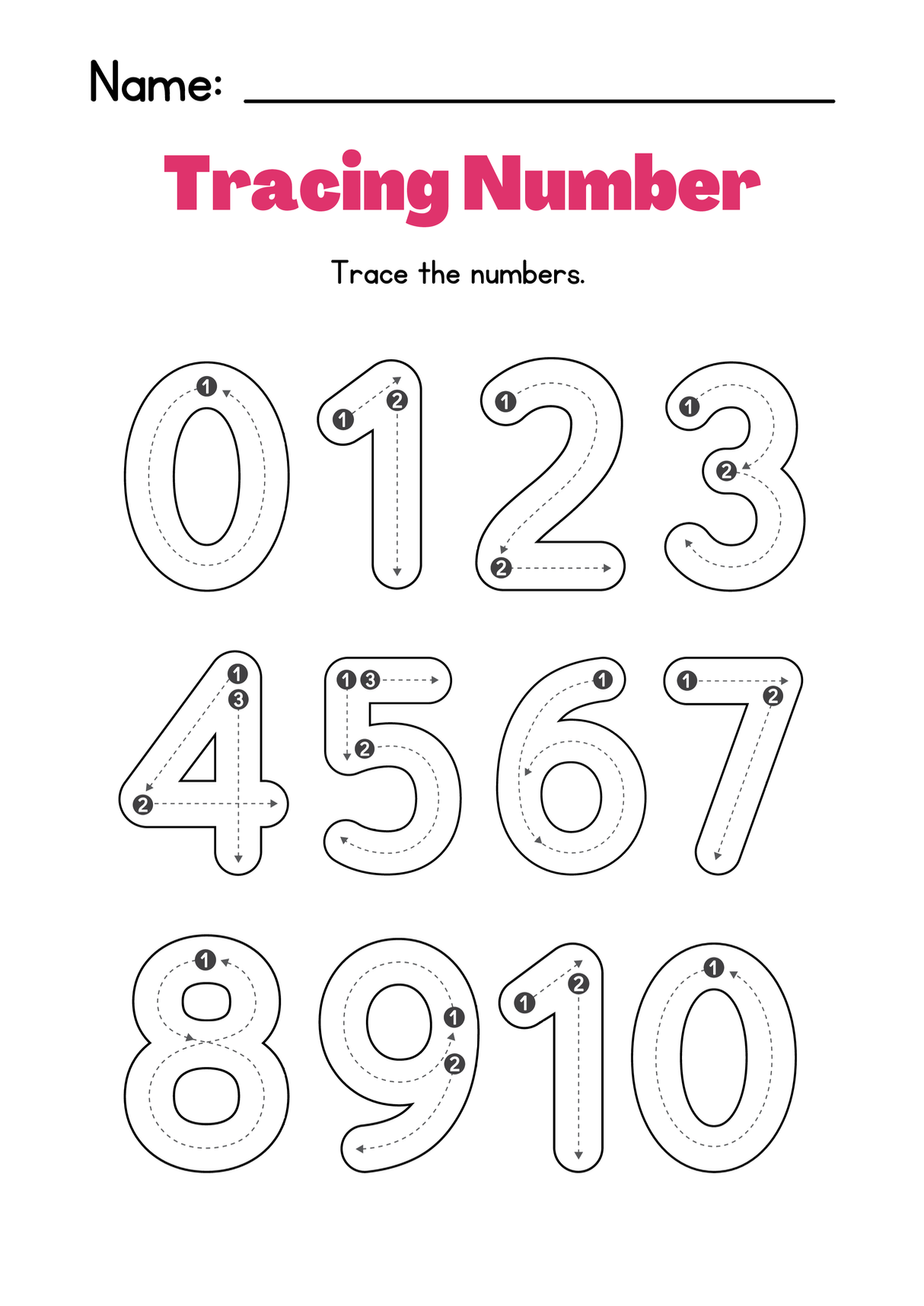
Number Tracing Worksheet (0-10): This comprehensive practice sheet features all numbers from 0 to 10 with dotted guidelines and directional arrows showing proper stroke order and formation for each number.
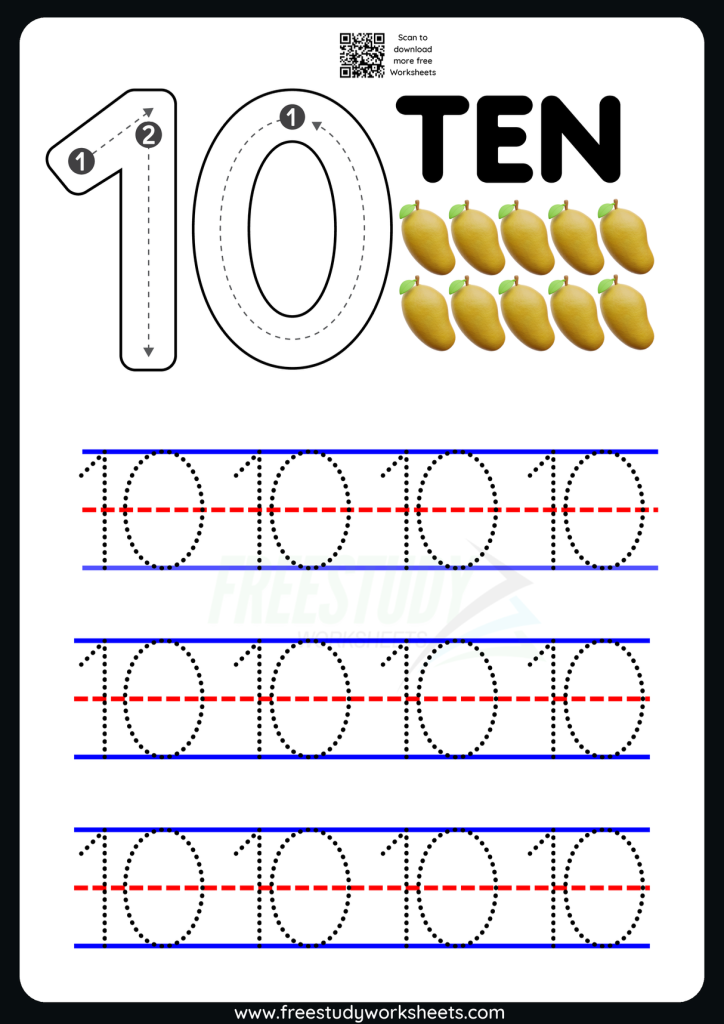
Number 10 Tracing Worksheet: Featuring ten mangoes, this practice sheet teaches proper number 10 formation with guided tracing and color-coded lines.
Core Features
Clear Number Formation
Each worksheet shows how to form numbers with the right shape and size. The bold outlines help children see exactly what each number should look like. This clear model helps them write numbers that others can read easily.
Starting Points
Green dots mark where to begin each number. Starting in the right place helps create well-formed numbers. These visual cues help children develop good habits that will help them later in maths lessons.
Practice Space
Plenty of room lets children try each number many times. The sheets have guided practice at the top and free practice at the bottom. This step-by-step approach builds skills and confidence.
Counting Activities
Each sheet includes things to count that match the number being traced. These counting tasks help connect the number symbol with its actual value. Children learn that “5” means five things.
Visual Aids
Pictures and dot patterns help children understand what numbers mean. These visual supports make learning more fun and meaningful. Children enjoy the colourful images that relate to each number.
Learning Elements
Number Recognition
Regular practice helps children quickly identify numbers when they see them. This basic skill is needed for all maths work. Children learn to tell different numbers apart, even similar ones like 6 and 9.
Proper Formation
The worksheets teach the correct way to write each number. Good number formation helps with maths tasks in school. When children write numbers clearly, they make fewer mistakes in their maths work.
Counting Skills
Counting activities help children understand what numbers mean. Each worksheet gives practice counting real objects. This connects number writing with actual counting skills.
Quantity Association
Children learn that each number stands for a specific amount. The worksheets show dots or pictures that match each number. This helps children understand what numbers really mean.
Sequential Ordering
Practice with number order helps children understand which numbers come before and after others. This basic skill helps with counting and calculation. Children learn the patterns in our number system.
Number Categories
1. Basic Numbers (1-10)
Individual Number Practice
Large Format Tracing
Big, clear numbers give beginners plenty of space to trace. The large size helps children who are still developing hand control. Each stroke is easy to see and follow.
Multiple Repetitions
Several chances to trace each number help build muscle memory. Children trace with heavy guidance first, then with less help. This gradual approach builds confidence and skill.
Formation Guides
Step-by-step guidance shows how to form each number correctly. Arrows and numbers show the right order and direction for each stroke. This prevents bad habits that can be hard to fix later.
Counting Activities
Simple counting tasks match each number being learned. For example, the number 5 sheet has five apples to count. These activities help children connect the number symbol with its value.
Picture Associations
Fun images help children remember each number. These pictures often start with the same sound as the number (like “six snakes”). This multi-sensory approach helps with memory and engagement.
check which numbers need more work. They help track progress and identify areas for more practice.
Free Printable Number Tracing Resources
Accessing Our Number Tracing Worksheets PDF Free Download
Our platform provides immediate access to high-quality printable number tracing worksheets in convenient PDF format. All resources are:
- Completely free to download and print
- Optimized for standard home and classroom printers
- Available in both color and black-and-white versions
- Suitable for repeated use with different children
Letter and Number Tracing Worksheets Combined
For comprehensive literacy development, we offer combined letter and number tracing worksheets that help children develop both numerical and alphabetical writing skills simultaneously.
Specialized Collections
Our organized collections include:
Our platform provides immediate access to high-quality printable number tracing worksheets in convenient PDF format. All resources are:
- Completely free to download and print
- Optimized for standard home and classroom printers
- Available in both color and black-and-white versions
- Suitable for repeated use with different children
Letter and Number Tracing Worksheets Combined
For comprehensive literacy development, we offer combined letter and number tracing worksheets that help children develop both numerical and alphabetical writing skills simultaneously.
Specialized Collections
Our organized collections include:
- Number tracing worksheets 1-20 PDF bundled packages
- Individual number tracing pages for targeted practice
- Themed seasonal and holiday number tracing activities
- Progressive difficulty levels within each number range
Interactive Features That Make Learning Fun
Number Recognition Games
Each number tracing sheet includes engaging recognition activities:
- Circle the number: Children identify and mark specific numbers among various distractors
- Number hunt: Searching for hidden numbers within complex designs
- Sequence completion: Identifying and filling missing numbers in patterns
Creative Coloring Components
Our worksheets integrate artistic elements:
- Color coordination activities: “Color 3 circles” or “Color 5 stars”
- Themed illustrations: Numbers paired with corresponding quantities of objects
- Seasonal designs: Holiday-themed counting and coloring combinations
Multi-Sensory Learning Elements
Number tracing practice becomes more effective through:
Number Recognition Games
Each number tracing sheet includes engaging recognition activities:
- Circle the number: Children identify and mark specific numbers among various distractors
- Number hunt: Searching for hidden numbers within complex designs
- Sequence completion: Identifying and filling missing numbers in patterns
Creative Coloring Components
Our worksheets integrate artistic elements:
- Color coordination activities: “Color 3 circles” or “Color 5 stars”
- Themed illustrations: Numbers paired with corresponding quantities of objects
- Seasonal designs: Holiday-themed counting and coloring combinations
Multi-Sensory Learning Elements
Number tracing practice becomes more effective through:
- Tactile experiences: Encouraging finger tracing before pencil use
- Verbal components: Speaking numbers aloud during tracing
- Visual associations: Connecting numbers with memorable images and characters
How to Use Number Tracing Worksheets Effectively
Preparation and Setup
Before beginning number tracing worksheets:
- Ensure proper pencil grip and posture
- Choose appropriate writing instruments (pencils, crayons, or markers)
- Create distraction-free learning environments
- Have multiple copies available for repeated practice
Progressive Learning Approach
Start with number 1 tracing and advance systematically:
- Demonstrate proper number formation
- Guide initial tracing attempts
- Encourage independent practice
- Celebrate progress and effort
- Move to more complex numbers gradually
Incorporating Daily Practice
Make number tracing part of regular learning routines:
- Short, focused 10-15 minute sessions
- Consistent daily practice times
- Variety in worksheet selection to maintain interest
- Integration with other mathematical activities
Assessment and Progress Tracking
Monitor development through:
- Regular review of completed worksheets
- Observation of independent number writing
- Documentation of improvement over time
- Celebration of milestone achievements
Specific Number Practice Sheets
Individual Number Focus
Detailed exploration of each number’s unique characteristics:
Applied Practice
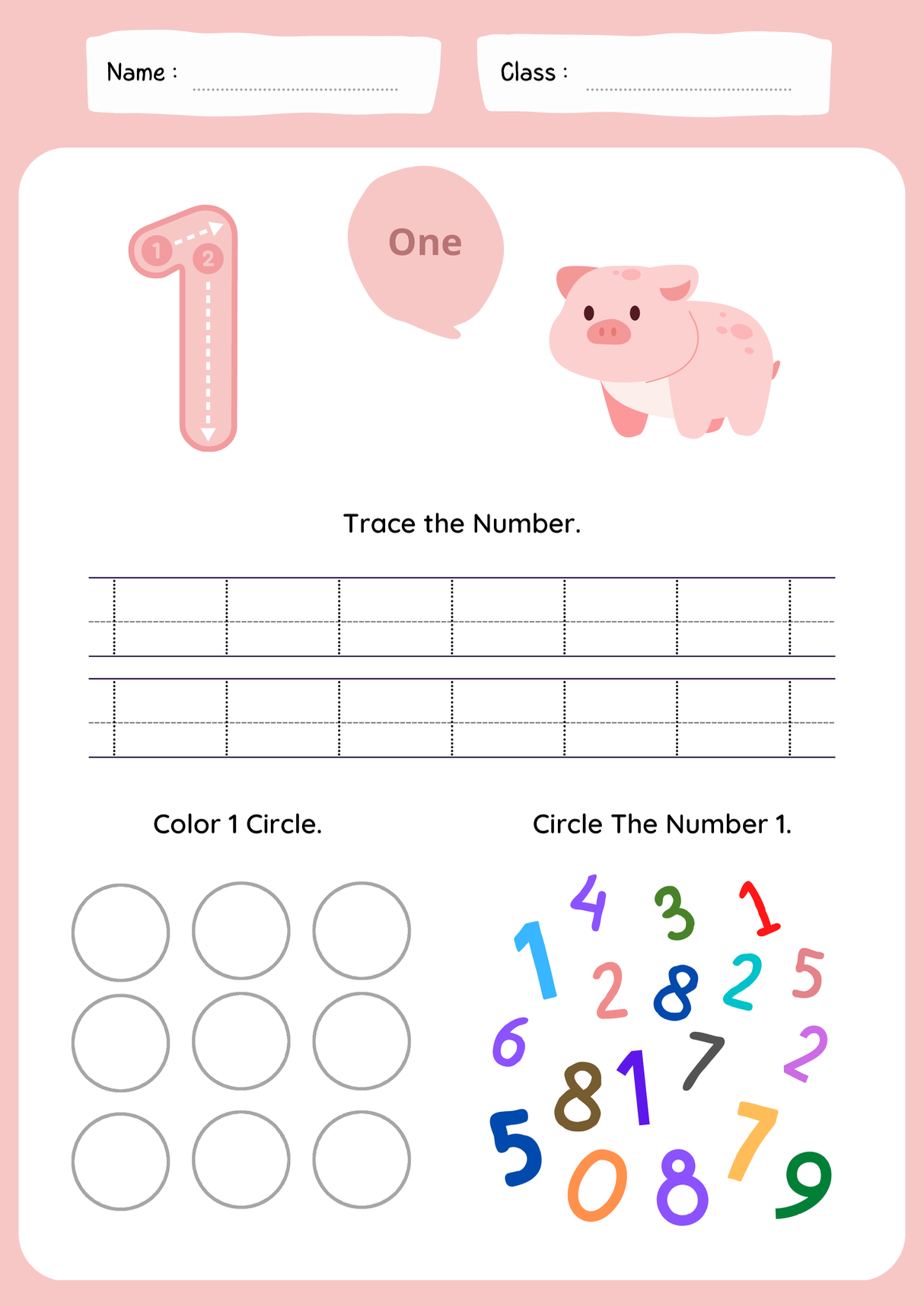
Number 1 Tracing Worksheets
Perfect for beginners, focusing on simple vertical line formation and basic motor control development.
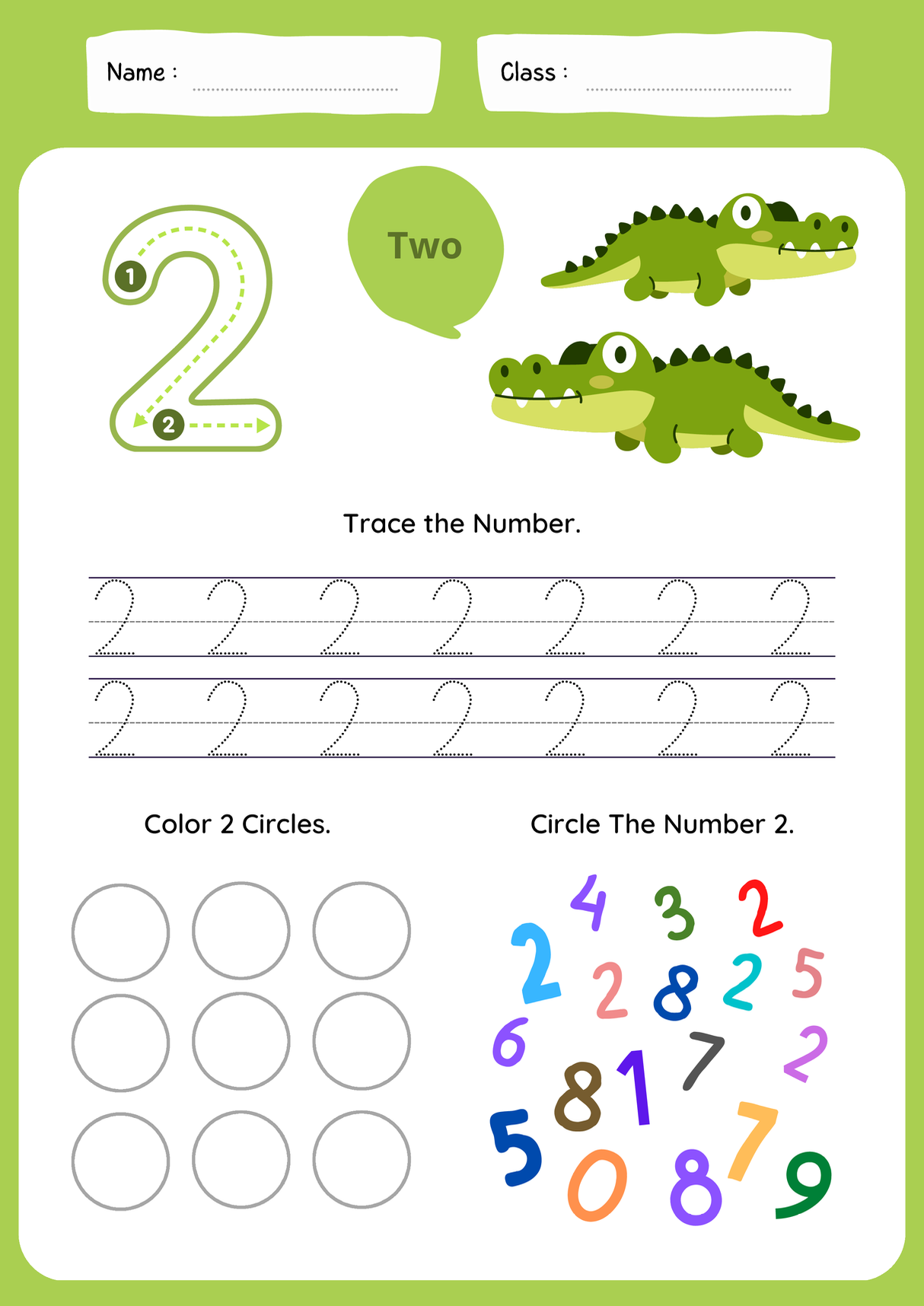
Number 2 Tracing Worksheet
Introduces curve-to-line transitions, helping children understand directional changes in number formation.
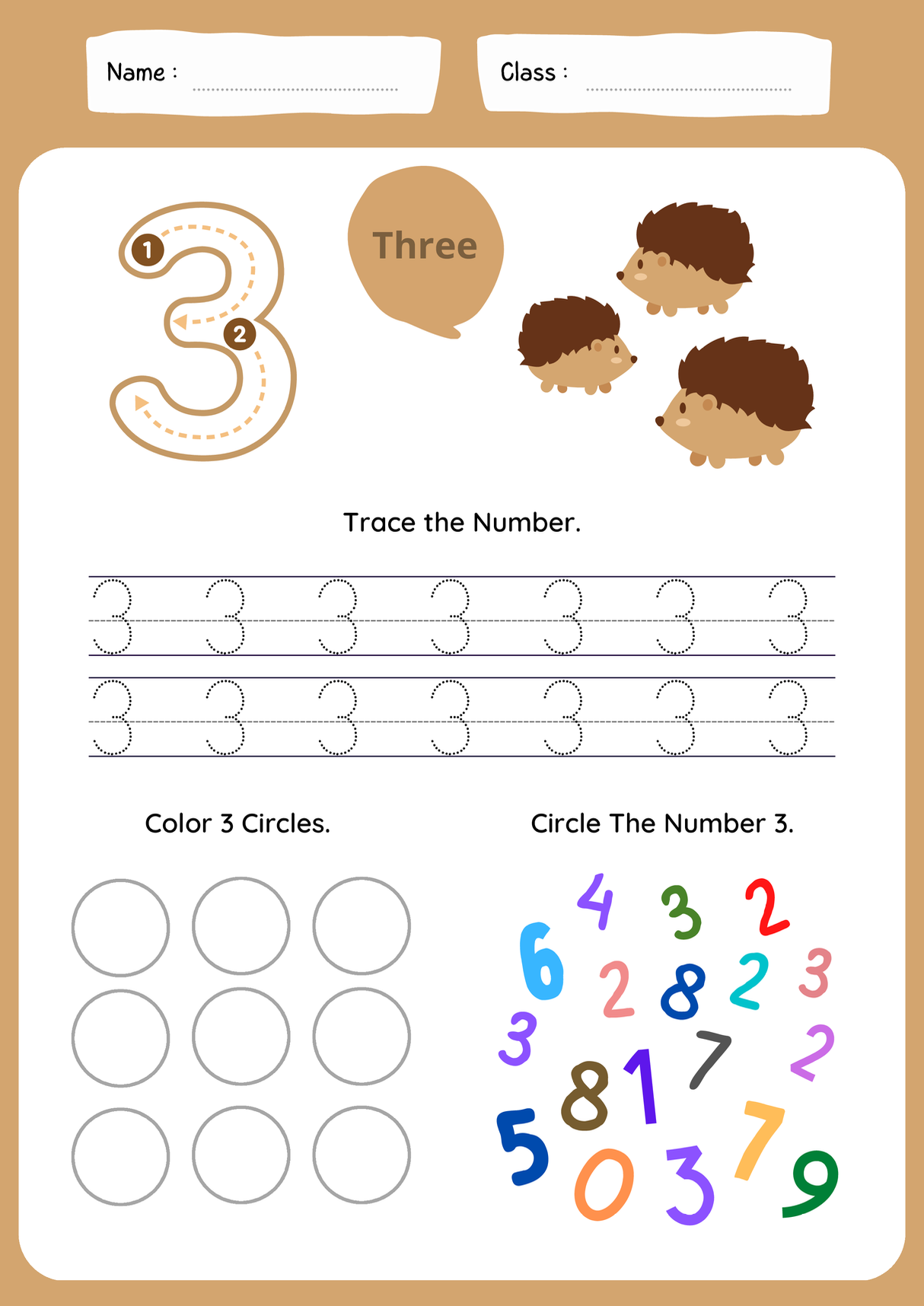
Number 3 Tracing Worksheet
Develops coordination skills through multiple curved sections, often challenging for young learners.

Number 4 Tracing Worksheet
Teaches angular line formation and crossing techniques essential for geometric understanding.

Number 5 Tracing Worksheet
Combines straight and curved elements, integrating various motor skills learned in previous numbers.

Number 6 Tracing Worksheet
Emphasizes circular motion control and closed-curve formation.

Number 7 Tracing Worksheet
Develops diagonal line coordination and directional awareness.

Number 8 Tracing Worksheet
Advanced figure-eight motion that challenges fine motor control and spatial reasoning.

Number 9 Tracing Worksheet
Complex curve and line combinations requiring advanced motor skills.
Number-Specific Learning Activities
Each number tracing worksheet includes targeted activities:
- Quantity matching exercises
- Real-world number identification
- Creative number art projects
- Number story and rhyme integration
Skill Development
1. Pre-Writing Skills
Foundation Building
Line Tracing
Basic stroke practice with straight and curved lines. These simple exercises build the hand control needed for numbers. They help children get comfortable with pencil control.
Circle Formation
Practice making circles and curves used in numbers like 0, 6, 8, and 9. These shapes are building blocks for many numbers. Children practise making circles of consistent size.
Shape Practice
Exercises tracing basic shapes that relate to number formation. Triangles, squares, and rectangles build skills for straight-line numbers. These develop control and precision.
Pattern Copying
Simple patterns to trace and copy independently. These build visual processing and hand coordination. Children learn to follow a model and reproduce it accurately.
Direction Following
Activities that build the habit of working from left to right and top to bottom. These reinforce the correct direction for writing in English. Good directional habits help with all writing tasks.
2. Number Writing
Formation Practice
Starting Points
Clear guidance on where to begin each number. Starting in the right place leads to well-formed numbers. Green dots show exactly where to put the pencil first.
Stroke Order
Step-by-step guidance for the correct sequence of lines and curves. The right stroke order makes writing faster and neater. Numbered arrows show which stroke comes first, second, and so on.
Size Consistency
Practice keeping numbers the same height and width. Even sizing makes maths work neater and more accurate. Guide lines help maintain consistent sizing.
Spacing Practice
Guidance for leaving the right amount of space between numbers. Good spacing prevents confusion between separate numbers. Children learn to give each number its own space.
Line Alignment
Help with placing numbers correctly on the baseline. Well-aligned numbers are easier to read in equations. Highlighted baselines guide proper placement.
Teaching Resources
1. Implementation Guide
Usage Instructions
Teaching Methods
Simple steps for introducing and teaching number formation. These methods come from experienced teachers. They include multi-sensory approaches that work for different learning styles.
Practice Sequence
Suggested order for teaching numbers effectively. This logical sequence builds skills progressively. It starts with easier numbers and moves to more complex ones.
Assessment Tools
Simple ways to check a child’s number formation progress. These informal checks help guide teaching. They show which numbers need more practice.
Progress Tracking
Easy methods to record improvement over time. Visual charts show which numbers have been mastered. These motivate children by showing their growth.
Success Indicators
Signs that show when a child is ready to move to the next level. These include consistency, speed, and independence. Recognizing these signs helps keep learning appropriately challenging.
2. Skill-Specific Sets
Targeted Practice
Number Order
Focused practice on arranging numbers in sequence. These activities build understanding of the number line. Children arrange numbers from smallest to largest and vice versa.
Skip Counting
Specialised sheets for counting by 2s, 5s, and 10s. These important patterns prepare for multiplication. Children trace, write, and complete skip counting sequences.
Number Bonds
Dedicated practice with pairs of numbers that make up a target number. For example, bonds of 10 include 1+9, 2+8, 3+7, etc. These build mental maths flexibility and number relationships.
Before/After
Worksheets focusing on numbers that come before or after a given number. These build fluency with number sequences. Children learn to move mentally up and down the number line.
Missing Numbers
Activities where children fill in missing numbers in a sequence. These check understanding of number patterns. They build analytical thinking and attention to number relationships.
About Number Tracing Worksheet
1. File Information
Download Specs
PDF Format
All worksheets provided as high-quality PDF files. This format ensures consistent appearance on all devices. PDFs work well for both digital use and printing.
Print Settings
Recommendations for optimal printing results. For best quality, print at actual size (100%) on standard paper. Avoid scaling that might distort the guide lines.
Paper Size
Worksheets formatted for standard A4 paper. This common size works with all printers. The familiar format fits standard folders and binders.
Colour Options
All sheets available in both colour and black-and-white versions. Colour versions have engaging visuals with red arrows and green starting dots. Black-and-white versions save ink while maintaining all learning elements.
Usage Rights
Clear information about how the worksheets may be used. These free resources can be used at home and in classrooms. Teachers may print copies for their students.
2. Practice Guidelines
Implementation Tips
Session Length
Advice on how long to spend on number practice. For young children, 5-10 minutes of focused practice works best. Short, regular sessions are more effective than occasional long ones.
Practice Frequency
Recommendations for how often to use the worksheets. Daily practice for a few minutes builds skills effectively. Consistency matters more than length of individual sessions.
Material Needs
List of helpful supplies for effective practice. Basic needs include pencils, erasers, and the printed worksheets. Optional items like pencil grips can help some children.
Space Setup
Tips for creating an effective practice environment. A flat surface with good lighting helps children see and write clearly. Proper seating supports good posture and pencil control.
Progress Tracking
Simple ways to monitor improvement over time. Keeping dated samples shows growth visually. Tracking sheets help record which numbers have been mastered.
Conclusion and Next Steps
Number tracing worksheets provide essential foundational support for children’s mathematical and writing development. Our comprehensive collection of free printable number tracing worksheets offers parents and educators versatile tools for engaging, effective learning experiences.
The combination of tracing practice, recognition games, and creative activities ensures that children develop not only technical writing skills but also deep number understanding and mathematical readiness. Whether using number tracing 1-10 for beginners or number tracing worksheets 1-100 for advanced learners, these resources support individualized learning progression.
Continue supporting your child’s learning journey by:
- Downloading age-appropriate number tracing worksheets PDF resources
- Establishing consistent daily practice routines
- Celebrating progress and maintaining positive learning attitudes
- Transitioning to more advanced mathematical concepts as skills develop
Start your child’s number learning adventure today with our free number tracing worksheets and watch their confidence and skills grow through engaging, purposeful practice.
Frequently Asked Questions
